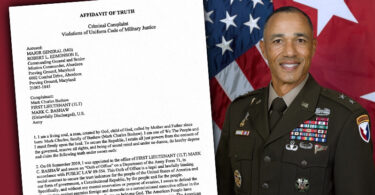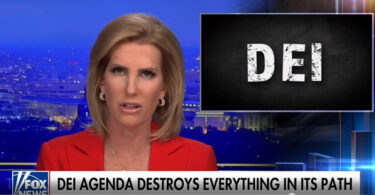By Nathaniel Cline | Virginia Mercury
As the Virginia Military Institute’s Board of Visitors awaits the state Supreme Court’s determination on the future of several gubernatorial appointments, the governing board has continued its duties, including making recent, significant changes to its bylaws and modifying the board’s responsibilities relating to diversity and inclusion.
The changes, which also included reassigning mental health oversight responsibilities, come amid pushback by conservatives who oppose diversity, equity and inclusion (DEI) initiatives, specifically in schools, and after the school renamed its DEI office in 2023.
“This is all a routine review of the bylaws, which we do regularly to ensure clarity and compliance with any legal updates,” Sherry Wallace, a VMI spokesperson, replied when asked to clarify the rationale for the changes.
The board moved the responsibilities of “mental and physical health” and “diversity and inclusion” from its Cadet and Personnel Affairs Committee to the renamed Operations and Personnel Affairs Committee.
The committee’s responsibilities now state it “shall have oversight of all matters related to human resources, classified and administrative/professional faculty compensation, inspector general, Title IX, inclusive excellence, information technology, VMI police, and post safety, security, and emergency management.”
VMI published an earlier version of the proposed bylaws, which excluded any mention of diversity and inclusion, last week. The board voted on a second version, published on Monday, during Wednesday’s business meeting.
VMI’s approach to diversity, equity and inclusion initiatives has been widely scrutinized since April 2023, when Martin Brown, the state diversity, opportunity and inclusion office director appointed by Gov. Glenn Youngkin, remarked that “DEI is dead” at the institute.
In 2022, Youngkin renamed the state’s DEI office to Diversity, Opportunity and Inclusion. The institution then renamed its office as well, which is “responsible for implementation of the Institute’s inclusive excellence program,” Wallace said.
The Spirit of VMI PAC, a political action committee comprising alumni, parents, and students, has expressed strong opposition to DEI initiatives.
The PAC urged supporters to “reject the woke assault on VMI,” which ultimately led to the removal of Wins, who had worked to implement DEI reforms and expand related offices.
Virginia state law requires agency heads to follow specific responsibilities regarding personnel management and the establishment of diversity, equity and inclusion strategic plans, which includes creating an infrastructure to “effectively support ongoing progress and achievements” by reporting DEI goals in coordination with the DEI director’s initiatives.
Board Member Thomas Gottwald, appointed by Youngkin, stated that the bylaws have been updated five times in the last four years, noting that “they need to adjust as our practices change and to make sure we stay in compliance with state code.”
He said the revisions are also in realignment with the board’s committee structure and responsibilities, which vary. The board can have up to 16 members. Currently, the board has 10 voting members, all of whom have been appointed by Youngkin.
The Senate Committee on Privileges and Elections rejected the VMI board appointees, among others, made by the governor, and sued three university leaders over the matter. The administration wants the Virginia Supreme Court to overturn a lower court’s decision that temporarily suspended the appointments of these individuals, along with others at George Mason University and the University of Virginia.
VMI’s list of changes to the bylaws also includes transferring several responsibilities to the executive committee, such as providing advice to the board president on committee structure, appointments and meetings, as well as overseeing the institute’s government relations programs.
The board voted to rename the External Relations Advancement Committee to the Advancement Committee and added the responsibility of oversight for “all strategic communications and marketing, as well as for coordinating between the Board and the VMI Alumni Agencies for alumni relations initiatives and strategic fundraising priorities.”
The changes include designating up to 30 minutes during meetings for public comment, with individuals limited to three minutes, and eliminating the Nominating and Governance Committee (N&G). The executive committee will take up the N&G committee’s responsibilities.
Sen. Jennifer Carroll Foy, D-Prince William, a VMI graduate, questioned some of the changes.
“The VMI BOV President, Jamie Inman, appears to be consolidating authority to himself and the executive committee with no oversight,” Carroll Foy said in a statement to the Mercury.
She also questioned the board’s intention to expand the executive committee’s “reach” to include fundraising, which she said “has always been under the purview of the Alumni Association and the Keydet Club.” And, she insisted that the board’s recent action is a “power grab by the VMI Board to significantly change the bylaws and the operation of the board before the next election.”
VMI’s Board of Visitors also welcomed its 16 superintendent, retired U.S. Marine Corps Lt. Gen. David Furness, to his first business meeting on Wednesday. The board announced the Furness’ hiring of the institution’s 16th superintendent last month after ousting Ret. Maj. Gen. Cedric Wins, the first Black superintendent. The updated bylaws will now give the superintendent the authority to call special meetings as permitted by state law.
Previously, special meetings could only be called by the board president, majority vote of the executive committee, or at the request of a majority of board members.
First published on Virginia Mercury








Leave a Comment